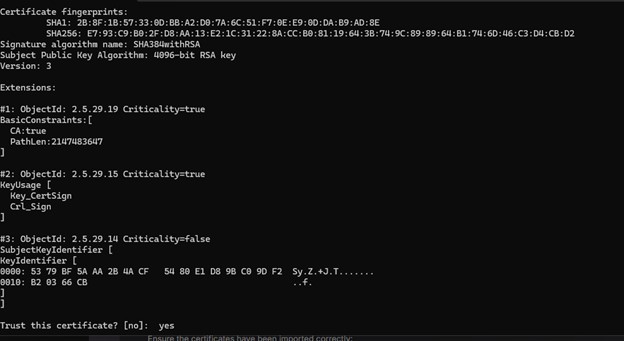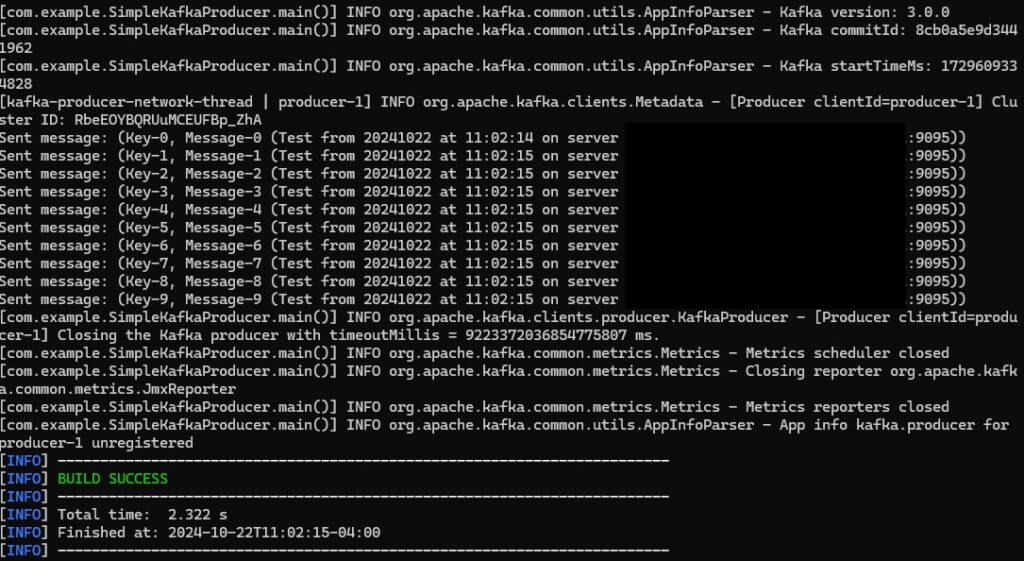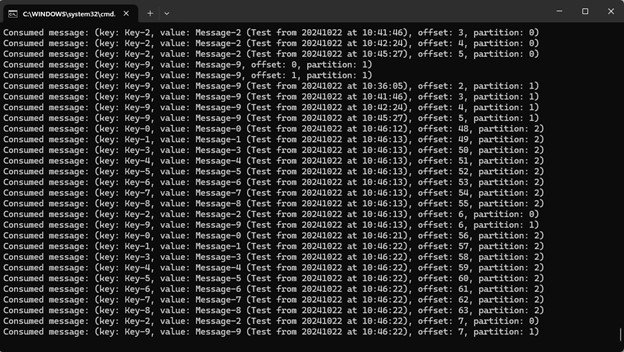Producer
package com.example;
import org.apache.kafka.clients.producer.KafkaProducer;
import org.apache.kafka.clients.producer.ProducerRecord;
import org.apache.kafka.clients.producer.ProducerConfig;
import org.apache.kafka.common.serialization.StringSerializer;
import java.io.InputStream;
import java.time.LocalDateTime;
import java.time.format.DateTimeFormatter;
import java.util.Properties;
public class SimpleKafkaProducer {
public static void main(String[] args) {
if (args.length < 2) {
System.err.println("Please provide Kafka server and port. Usage: SimpleKafkaProducer <kafka-server> <port>");
System.exit(1);
}
String kafkaHost = args[0];
String kafkaPort = args[1];
String kafkaServer = kafkaHost + ":" + kafkaPort;
String topicName = "LJRJavaTest";
String truststorePassword = "truststore-password";
Properties props = new Properties();
props.put(ProducerConfig.BOOTSTRAP_SERVERS_CONFIG, kafkaServer);
props.put(ProducerConfig.KEY_SERIALIZER_CLASS_CONFIG, StringSerializer.class.getName());
props.put(ProducerConfig.VALUE_SERIALIZER_CLASS_CONFIG, StringSerializer.class.getName());
// Load truststore from resources
try (InputStream truststoreStream = SimpleKafkaProducer.class.getResourceAsStream("/kafka.client.truststore.jks")) {
if (truststoreStream == null) {
throw new RuntimeException("Truststore not found in resources");
}
// Create a temporary file to hold the truststore
java.nio.file.Path tempTruststore = java.nio.file.Files.createTempFile("kafka.client.truststore", ".jks");
java.nio.file.Files.copy(truststoreStream, tempTruststore, java.nio.file.StandardCopyOption.REPLACE_EXISTING);
props.put("security.protocol", "SSL");
props.put("ssl.truststore.location", tempTruststore.toString());
props.put("ssl.truststore.password", truststorePassword);
KafkaProducer<String, String> producer = new KafkaProducer<>(props);
// Define the date-time formatter
DateTimeFormatter formatter = DateTimeFormatter.ofPattern("yyyyMMdd 'at' HH:mm:ss");
try {
for (int i = 0; i < 10; i++) {
String key = "Key-" + i;
// Get the current timestamp
String timestamp = LocalDateTime.now().format(formatter);
// Include the timestamp, Kafka host, and port in the message value
String value = String.format("Message-%d (Test from %s on server %s:%s)", i, timestamp, kafkaHost, kafkaPort);
ProducerRecord<String, String> record = new ProducerRecord<>(topicName, key, value);
producer.send(record);
System.out.println("Sent message: (" + key + ", " + value + ")");
}
} catch (Exception e) {
e.printStackTrace();
} finally {
producer.close();
}
} catch (Exception e) {
e.printStackTrace();
}
}
}
Consumer
package com.example;
import org.apache.kafka.clients.consumer.ConsumerConfig;
import org.apache.kafka.clients.consumer.ConsumerRecords;
import org.apache.kafka.clients.consumer.KafkaConsumer;
import org.apache.kafka.clients.consumer.ConsumerRecord;
import org.apache.kafka.common.serialization.StringDeserializer;
import java.io.InputStream;
import java.time.Duration;
import java.util.Collections;
import java.util.Properties;
public class SimpleKafkaConsumer {
public static void main(String[] args) {
if (args.length < 2) {
System.err.println("Please provide Kafka server and port. Usage: SimpleKafkaConsumer <kafka-server> <port>");
System.exit(1);
}
String kafkaServer = args[0] + ":" + args[1];
String topicName = "LJRJavaTest";
String groupId = "test-consumer-group";
String truststorePassword = "truststore-password";
Properties props = new Properties();
props.put(ConsumerConfig.BOOTSTRAP_SERVERS_CONFIG, kafkaServer);
props.put(ConsumerConfig.GROUP_ID_CONFIG, groupId);
props.put(ConsumerConfig.KEY_DESERIALIZER_CLASS_CONFIG, StringDeserializer.class.getName());
props.put(ConsumerConfig.VALUE_DESERIALIZER_CLASS_CONFIG, StringDeserializer.class.getName());
props.put(ConsumerConfig.AUTO_OFFSET_RESET_CONFIG, "earliest");
// Load truststore from resources
try (InputStream truststoreStream = SimpleKafkaConsumer.class.getResourceAsStream("/kafka.client.truststore.jks")) {
if (truststoreStream == null) {
throw new RuntimeException("Truststore not found in resources");
}
// Create a temporary file to hold the truststore
java.nio.file.Path tempTruststore = java.nio.file.Files.createTempFile("kafka.client.truststore", ".jks");
java.nio.file.Files.copy(truststoreStream, tempTruststore, java.nio.file.StandardCopyOption.REPLACE_EXISTING);
props.put("security.protocol", "SSL");
props.put("ssl.truststore.location", tempTruststore.toString());
props.put("ssl.truststore.password", truststorePassword);
KafkaConsumer<String, String> consumer = new KafkaConsumer<>(props);
consumer.subscribe(Collections.singletonList(topicName));
try {
while (true) {
ConsumerRecords<String, String> records = consumer.poll(Duration.ofMillis(100));
for (ConsumerRecord<String, String> record : records) {
System.out.printf("Consumed message: (key: %s, value: %s, offset: %d, partition: %d)%n",
record.key(), record.value(), record.offset(), record.partition());
}
}
} catch (Exception e) {
e.printStackTrace();
} finally {
consumer.close();
}
} catch (Exception e) {
e.printStackTrace();
}
}
}
Keystore for Trusts
The cert on my Kafka server is signed by a CA that has both a root and intermediary signing certificate. To trust the chain, I need to populate rootCA.crt and intermediateCA.crt files with the correct base64 encoded public key and import both files into a new trust store:
keytool -importcert -file rootCA.crt -keystore kafka.client.truststore.jks -alias rootCA -storepass truststore-password
keytool -importcert -file intermediateCA.crt -keystore kafka.client.truststore.jks -alias intermediateCA -storepass truststore-password

Then list certs in the trust store to verify the import was successful:
keytool -list -keystore kafka.client.truststore.jks -storepass truststore-password

And place the jks keystore with the CA certs in project:
C:.
│ pom.xml
│
├───src
│ └───main
│ ├───java
│ │ └───com
│ │ └───example
│ │ SimpleKafkaProducer.java
│ │
│ └───resources
│ kafka.client.truststore.jks
Build and Run
Create a pom.xml for the build
<project xmlns="http://maven.apache.org/POM/4.0.0"
xmlns:xsi="http://www.w3.org/2001/XMLSchema-instance"
xsi:schemaLocation="http://maven.apache.org/POM/4.0.0 http://maven.apache.org/xsd/maven-4.0.0.xsd">
<modelVersion>4.0.0</modelVersion>
<groupId>com.example</groupId>
<artifactId>kafka-producer-example</artifactId>
<version>1.0-SNAPSHOT</version>
<properties>
<maven.compiler.source>1.8</maven.compiler.source>
<maven.compiler.target>1.8</maven.compiler.target>
</properties>
<dependencies>
<!-- Kafka client dependency -->
<dependency>
<groupId>org.apache.kafka</groupId>
<artifactId>kafka-clients</artifactId>
<version>3.0.0</version>
</dependency>
</dependencies>
<build>
<plugins>
<!-- Compiler plugin to ensure Java 8 compatibility -->
<plugin>
<groupId>org.apache.maven.plugins</groupId>
<artifactId>maven-compiler-plugin</artifactId>
<version>3.8.1</version>
<configuration>
<source>1.8</source>
<target>1.8</target>
</configuration>
</plugin>
<!-- Exec Maven Plugin to run the Java class -->
<plugin>
<groupId>org.codehaus.mojo</groupId>
<artifactId>exec-maven-plugin</artifactId>
<version>3.0.0</version>
<configuration>
<mainClass>com.example.SimpleKafkaProducer</mainClass>
</configuration>
</plugin>
</plugins>
</build>
</project>
Build using `mvn clean package`
Run the producer using ` mvn exec:java -Dexec.mainClass=”com.example.SimpleKafkaProducer” -Dexec.args=”kafkahost.example.net 9095″`

Run the consumer using ` mvn exec:java -Dexec.mainClass=”com.example.SimpleKafkaConsumer” -Dexec.args=”kafkahost.example.net 9095″`



